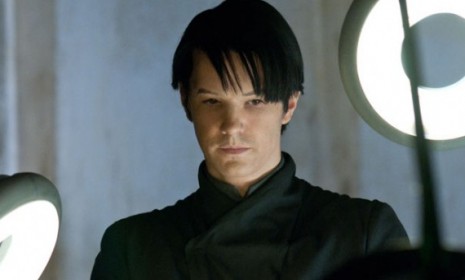Is Cloud Atlas racist?
The new film, which hits theaters tomorrow, has been attacked by numerous commentators for using white actors to play Asian characters

A free daily email with the biggest news stories of the day – and the best features from TheWeek.com
You are now subscribed
Your newsletter sign-up was successful
Critics have tipped Cloud Atlas, the ambitious film based on David Mitchell's novel of the same name, as one of the year's most intriguing new releases — but charges of racism are also making it among the most controversial. (Watch the Cloud Atlas trailer below.) Several commentators have targeted the new film, whose centuries-spanning plot features an ensemble cast that includes Tom Hanks and Halle Berry, for the extensive makeup work it relies on to let white actors play non-white roles — particularly the "yellowface" makeup intended to make actors like Jim Sturgess and Hugo Weaving appear Asian for a segment of the film set in "Neo-Seoul" circa 2144. Is Cloud Atlas, which opens tomorrow, really racist, or is its extensive racial cross-casting justified?
Yes, Cloud Atlas is racist: Cloud Atlas "missed a great opportunity" and proved that Hollywood believes "badly done yellowface is still okay," says Guy Aoki, the president of the Media Action Network for Asian Americans, in a statement quoted in The Hollywood Reporter. The Korean liberator played by the white Jim Sturgess "would have been a great, stereotype-busting role for an Asian American actor"; such actors are rarely afforded the opportunity to play dynamic or heroic characters by Hollywood. And the unconvincing "yellowface" worn by Sturgess and Weaving makes the snub even worse, proving that "the makeup artists believed they only had to change their eyes, not their facial structure and complexion" to make the actors appear to be Asian.
"'Cloud Atlas' Slammed for Lack of Asian Actors, 'Yellow Face' Makeup By Advocacy Group"
The Week
Escape your echo chamber. Get the facts behind the news, plus analysis from multiple perspectives.

Sign up for The Week's Free Newsletters
From our morning news briefing to a weekly Good News Newsletter, get the best of The Week delivered directly to your inbox.
From our morning news briefing to a weekly Good News Newsletter, get the best of The Week delivered directly to your inbox.
Accusing Cloud Atlas of racism is missing the point: The outrage about the racial dynamics in Cloud Atlas "seems misplaced to me," says Drew McWeeny at HitFix. Cloud Atlas "has so many other racial ideas in the mix" that "reducing the film to yellowface, as if that's the driving idea behind the makeup, seems inflammatory" — this is, after all, a movie that also casts Korean Doona Bae as a young, white American girl and African-American Halle Berry as a white German Jew. The cross-casting of Cloud Atlas isn't intended to be racially exclusionary; in fact, it's supposed to symbolize "the interconnected nature of all humanity," which makes Cloud Atlas exactly the wrong target "if someone wants to talk about institutionalized racism and the whitewashing of other cultures."
"Watch: Tom Hanks and Halle Berry on race, love, and made-up language in 'Cloud Atlas'"
Cloud Atlas may mean well — but its racial dynamics are still troubling: I understand what Cloud Atlas is going for, says Kathryn Schulz at Vulture, but "I think you have to be oblivious to the history of racism in the United States" to dismiss the yellowface concerns entirely. Yes, Doona Bae and Halle Berry appear in what could be called "whiteface," but Hollywood's long bias toward white actors means that there's "no easy equivalency between white actors playing nonwhite roles and nonwhite actors playing white ones." And even without the yellowface concerns, why do all the "Asian" characters in 2144's Neo-Seoul speak English in unconvincing faux-Korean accents, instead of subtitled Korean? Cloud Atlas' heart may be in the right place, but its use of tired racial signifiers "is, in every sense of the word, alienating."
"Cloud Atlas Rumble: A Movie and Book Critic Square Off Over the Centuries-Spanning Film"
A free daily email with the biggest news stories of the day – and the best features from TheWeek.com

-
 ‘Restaurateurs have become millionaires’
‘Restaurateurs have become millionaires’Instant Opinion Opinion, comment and editorials of the day
-
 Earth is rapidly approaching a ‘hothouse’ trajectory of warming
Earth is rapidly approaching a ‘hothouse’ trajectory of warmingThe explainer It may become impossible to fix
-
 Health insurance: Premiums soar as ACA subsidies end
Health insurance: Premiums soar as ACA subsidies endFeature 1.4 million people have dropped coverage